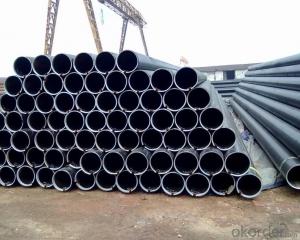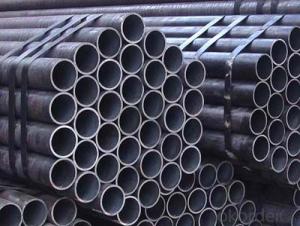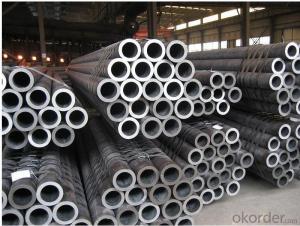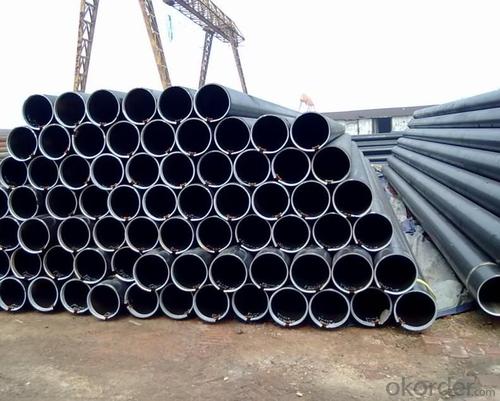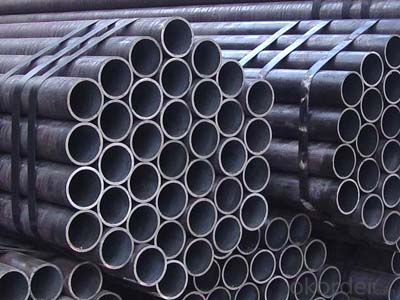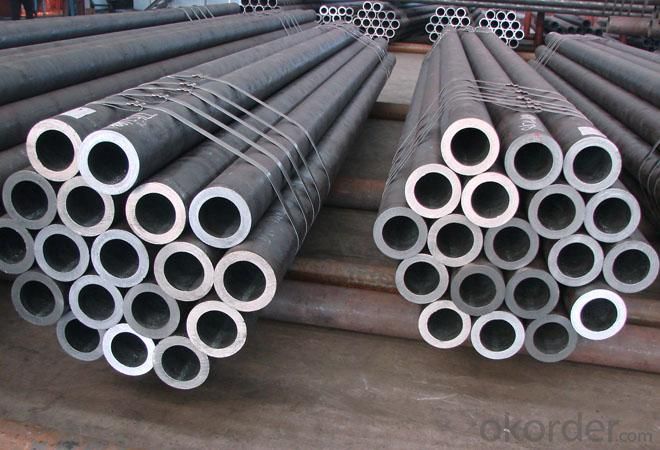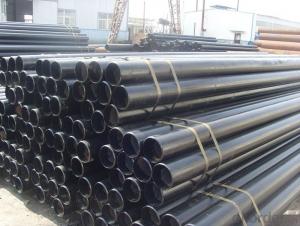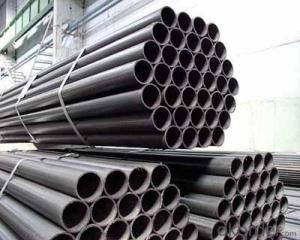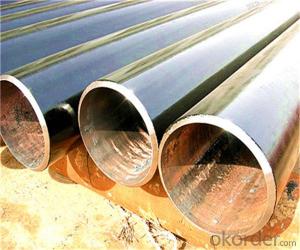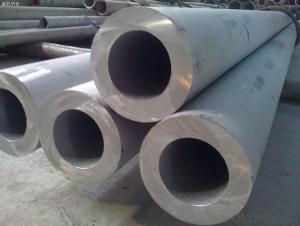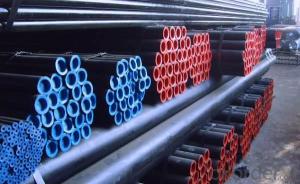Seamless Steel Pipe With Best Quality And High Quality GB5310
- Loading Port:
- Tianjin
- Payment Terms:
- TT or LC
- Min Order Qty:
- 25 m.t
- Supply Capability:
- 9000 m.t/month
OKorder Service Pledge
OKorder Financial Service
You Might Also Like
1、Structure of Seamless Pipe GB5310:
Seamless pipe is formed by drawing a solid billet over a piercing rod to create the hollow shell. As the manufacturing process does not include any welding, seamless pipes are perceived to be stronger and more reliable. Historically seamless pipe was regarded as withstanding pressure better than other types, and was often more easily available than welded pipe.
Standard: GB5310: Seamless Steel Tubes And Pipes for High Pressure Boiler
● Application: For manufacture heating-pipelines, containers, coal-saving devices, super heaters and reheaters
of high pressure boilers(P>9.8Mpa,450℃<T<650℃)
● Steel Grade: 20G、20MnG、15MnG、15MnG、12Cr2MnG、12Cr1MoVG (etc),Other grade can also be provided
after consulting with customers.
2、Main Features of the Seamless PipeGB5310:
• High manufacturing accuracy
• High strength
• Small inertia resistance
• Strong heat dissipation ability
• Good visual effect
• Reasonable price
3、Seamless Pipe GB5310 Specification:
Standard | GB, DIN, ASTM ASTM A106-2006, ASTM A53-2007 |
Grade | 10#-45#, 16Mn 10#, 20#, 45#, 16Mn |
Thickness | 8 - 33 mm |
Section Shape | Round |
Outer Diameter | 133 - 219 mm |
Place of Origin | Shandong, China (Mainland) |
Secondary Or Not | Non-secondary |
Application | Hydraulic Pipe |
Technique | Cold Drawn |
Certification | API |
Surface Treatment | factory state or painted black |
Special Pipe | API Pipe |
Alloy Or Not | Non-alloy |
Length | 5-12M |
Outer Diameter | 21.3-610mm |
Grade | 20#, 45#, Q345, API J55, API K55, API L80, API N80, API P110, A53B |
Standard | ASME, ASTM |
1) Material:20#(ASTM A 106/A53 GRB.API5LGRB,GB),45#,16Mn,10#.
2) Specification range:OD:21.3-610mm,WT:6-70mm,length:6-12m or according to the requirement of clients.
3) Excutive standards:GB,ASME API5L.ASTM A 106/A53,Despite of the above standards,we can also supply seamless steel pipe with standard of DIN,JIS,and so on,and also develop new products according to the requirements of our clients!
4) Surface:black lacquered,varnish coating or galvanized.
5) Ends:Beveled or square cut,plastic capped,painted.
6) Packing:bundles wrapped with strong steel strip,seaworthy packing.
4、Packaging & Delivery
Packaging Details: | seaworthy package,bundles wrapped with strong steel strip |
Delivery Detail: | 15-30days after received 30%TT |
5、FAQ of Seamless Pipe GB5310:
①How is the quality of your products?
Our products are manufactured strictly according to national and internaional standard, and we take a test
on every pipe before delivered out. If you want see our quality certifications and all kinds of testing report, please just ask us for it.
Guaranteed: If products’ quality don’t accord to discription as we give or the promise before you place order, we promise 100% refund.
②How about price?
Yes, we are factory and be able to give you lowest price below market one, and we have a policy that “ for saving time and absolutely honest business attitude, we quote as lowest as possible for any customer, and discount can be given according to quantity”,if you like bargain and factory price is not low enough as you think, just don’t waste your time.Please trust the quotation we would give you, it is professional one.
③Why should you chose us?
Chose happens because of quality, then price, We can give you both.Additionally, we can also offer professional products inquiry, products knowledge train(for agents), smooth goods delivery, exellent customer solution proposals.Our service formula: good quality+good price+good service=customer’s trust
SGS test is available, customer inspection before shipping is welcome, third party inspection is no problem.
6、Seamless Pipe GB53103Images:
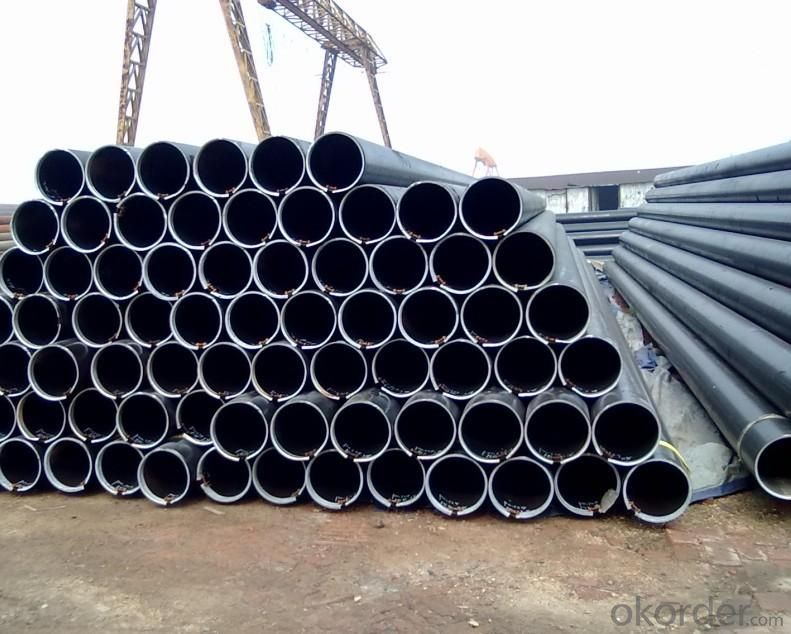
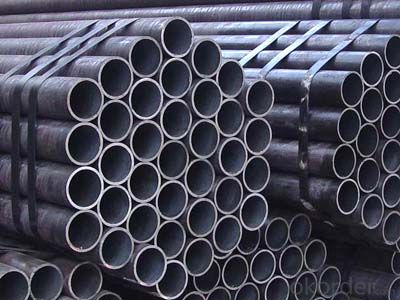
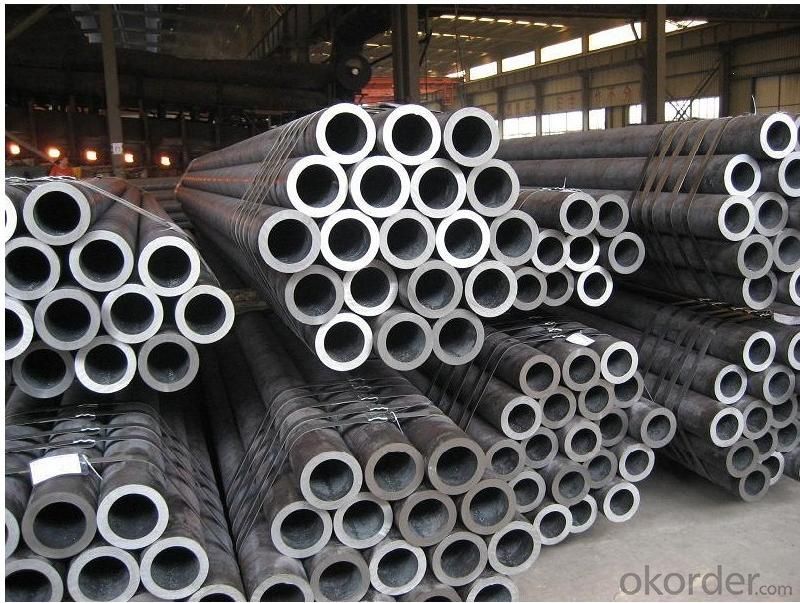
- Q: Can steel pipes be used for chemical refineries?
- Yes, steel pipes can be used for chemical refineries. Steel pipes are commonly used in chemical industries due to their high strength, durability, and resistance to corrosion. They can withstand high pressure and temperature conditions, making them suitable for transporting various chemicals and fluids within a refinery. Additionally, steel pipes can be easily welded, ensuring a secure and leak-proof system in chemical refineries.
- Q: DN80 seamless steel tube, what is the standard thickness?
- Commonly used DN80 seamless steel pipe caliber should be 89mm*4mm.
- Q: Can steel pipes be used for cooling systems?
- Yes, steel pipes can be used for cooling systems. Steel pipes are commonly used in various industrial cooling applications due to their durability, high strength, resistance to corrosion, and ability to withstand high pressure and temperature conditions.
- Q: Are steel pipes resistant to UV radiation?
- Yes, steel pipes are generally resistant to UV radiation. UV radiation is known to cause damage to materials over time, such as fading, discoloration, and degradation. However, steel pipes are typically coated with protective layers, such as paint or galvanization, which help to shield them from UV radiation. These coatings act as a barrier, preventing the direct exposure of steel to UV rays and minimizing the potential for damage. Additionally, the inherent properties of steel, including its strength and durability, make it less susceptible to the effects of UV radiation compared to other materials like plastics or rubber. However, it is important to note that prolonged exposure to intense UV radiation can still have some impact on steel pipes, such as slight discoloration or surface degradation. Regular maintenance and inspection are recommended to ensure the continued performance and longevity of steel pipes in outdoor or UV-exposed environments.
- Q: How do you determine the wall thickness of a steel pipe?
- The wall thickness of a steel pipe can be determined by measuring the outer diameter (OD) and the inner diameter (ID) of the pipe, and then subtracting the ID from the OD.
- Q: Is there a weld on the outer wall of seamless steel tube?
- Seamless steel pipe's inner wall, outer wall, section, cross section can not see the weld seam. Because seamless steel pipe is a molding product, no late roll pressure, welding and other processes. No section, inner wall, outer wall or section, as long as there is weld, it is not seamless steel tube. The inner wall can not see the outer wall of welding seam, but it can be seen that the weld products are fake or polished goods. Some products can not be seen without friction and have weld seams on the outside wall. They are seamless treated steel tubes and are polished goods. The price is much different from the real seamless steel tube. Some bad wounding, confusing concepts, earn illegal profits.
- Q: What are the different coatings applied to steel pipes?
- There are various coatings that can be applied to steel pipes to enhance their durability and protect them from corrosion. Some common coatings include fusion-bonded epoxy (FBE), which provides excellent corrosion resistance, and polyethylene (PE), which offers high impact strength. Other coatings include polyurethane (PU) and coal tar enamel, which provide additional protection against abrasion and chemical corrosion. Additionally, zinc coatings such as hot-dip galvanizing are used to prevent rust and extend the lifespan of steel pipes.
- Q: What are the common standards for steel pipe manufacturing?
- Steel pipe manufacturing is regulated by various common standards that guarantee the excellence and uniformity of the products. One of the most renowned standards is the American Society for Testing and Materials (ASTM) standard, which encompasses diverse specifications for different kinds of steel pipes. These specifications encompass dimensions, mechanical properties, and testing prerequisites. Another widespread standard is the American National Standards Institute (ANSI) standard, which establishes directives for the manufacturing procedure, material requirements, and performance attributes of steel pipes. ANSI standards are commonly employed in industrial applications and construction undertakings. Furthermore, international standards such as the International Organization for Standardization (ISO) standard exist, providing guidelines for the design, production, and testing of steel pipes. The ISO standard ensures that steel pipes align with global quality and safety standards. Moreover, specific industries may have their own standards for steel pipe manufacturing. For instance, the American Petroleum Institute (API) has devised standards exclusively for oil and gas industry applications. These standards, like API 5L, outline requirements for the manufacturing, testing, and inspection of steel pipes employed in the transportation of oil and gas. Ultimately, these common standards for steel pipe manufacturing play a vital role in guaranteeing the quality, dependability, and safety of the products. They establish a standardized framework that manufacturers can adhere to, enabling customers to have confidence in the performance and durability of the steel pipes they acquire.
- Q: What are the common sizes of steel pipe fittings?
- The common sizes of steel pipe fittings can vary depending on the specific application and industry standards. However, there are several standard sizes that are commonly used across different industries. These sizes range from ¼ inch to 48 inches in diameter. Some of the most common sizes include ½ inch, ¾ inch, 1 inch, 1 ¼ inch, 1 ½ inch, 2 inch, 2 ½ inch, 3 inch, 4 inch, 6 inch, 8 inch, 10 inch, 12 inch, 14 inch, 16 inch, 18 inch, 20 inch, 24 inch, 30 inch, 36 inch, 42 inch, and 48 inch. These sizes are often available in various lengths to accommodate different installation requirements. It is important to consult industry standards and specifications to determine the appropriate size of steel pipe fittings for a specific project.
- Q: Are galvanized steel tubes the same as degaussing steel tubes?
- Also known as galvanized steel pipe, hot galvanized and galvanized two kinds, hot galvanized, zinc coating thickness, with uniform coating, adhesion, and long service life. The cost of galvanizing is low, the surface is not very smooth, and the corrosion resistance of itself is much worse than that of galvanized pipe.
Send your message to us
Seamless Steel Pipe With Best Quality And High Quality GB5310
- Loading Port:
- Tianjin
- Payment Terms:
- TT or LC
- Min Order Qty:
- 25 m.t
- Supply Capability:
- 9000 m.t/month
OKorder Service Pledge
OKorder Financial Service
Similar products
Hot products
Hot Searches
Related keywords
